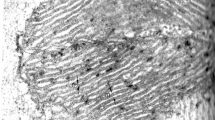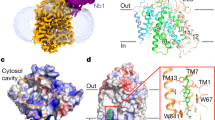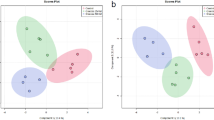Abstract
GLUCONEOGENESIS has been demonstrated in slices of renal cortex removed from rats fed on ammonium chloride, whereas rats fed on sodium bicarbonate showed a marked reduction in renal glucose production1. Gluconeogenesis by the rat kidney is closely related to the hydrogen ion concentration of the incubation media and it occurs in the presence of a variety of substrates.
This is a preview of subscription content, access via your institution
Access options
Subscribe to this journal
Receive 51 print issues and online access
$199.00 per year
only $3.90 per issue
Buy this article
- Purchase on Springer Link
- Instant access to full article PDF
Prices may be subject to local taxes which are calculated during checkout
Similar content being viewed by others
References
Fuisz, A., Goodman, D., Kamm, D. E., Cahill, G. F., and Marble, A., J. Clin. Invest., 44, 1049 (1965).
Wolf, A. V., Amer. J. Physiol., 133, 496 (1941).
Aber, G. M., and Bishop, J. M., Clin. Sci., 28, 511 (1965).
Fenton, J. C. B., Clin. Chim. Acta, 7, 163 (1962).
Middleton, J. E., and Griffiths, W. J., Brit. Med. J., ii, 1525 (1957).
Author information
Authors and Affiliations
Rights and permissions
About this article
Cite this article
ABER, G., MORRIS, L. & HOUSLEY, E. Gluconeogenesis by the Human Kidney. Nature 212, 1589–1590 (1966). https://doi.org/10.1038/2121589a0
Published:
Issue Date:
DOI: https://doi.org/10.1038/2121589a0
This article is cited by
-
Metabolic acidosis in chronic kidney disease: mere consequence or also culprit?
Pflügers Archiv - European Journal of Physiology (2024)
-
Kidney metabolism and acid–base control: back to the basics
Pflügers Archiv - European Journal of Physiology (2022)
-
Interactions between kidney disease and diabetes: dangerous liaisons
Diabetology & Metabolic Syndrome (2016)
-
Role of the kidney in hyperglycemia in type 2 diabetes
Current Diabetes Reports (2002)
-
Die menschliche Niere als bedeutsamer Glucoseproduzent
Medizinische Klinik (1998)
Comments
By submitting a comment you agree to abide by our Terms and Community Guidelines. If you find something abusive or that does not comply with our terms or guidelines please flag it as inappropriate.



